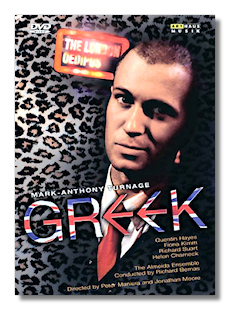
The Internet's Premier Classical Music Source
Related Links
- Turnage Reviews
- Latest Reviews
- More Reviews
-
By Composer
-
Collections
DVD & Blu-ray
Books
Concert Reviews
Articles/Interviews
Software
Audio
Search Amazon
Recommended Links
Site News
 DVD Review
DVD Review
Mark-Anthony Turnage

Greek
- Quentin Hayes (Eddy)
- Fiona Kimm (Wife, Doreen, Waitress 1, Sphinx 2)
- Helen Charnock (Mum, Waitress 2, Sphinx 1)
- Richard Suart (Dad, Café Manager, Chief of Police)
The Almeida Ensemble/Richard Bernas
Arthaus Musik DVD 102105 81:00
English composer Mark-Anthony Turnage, who rose to prominence in the 1980s, doesn't shy away from outrageousness. For example, Three Screaming Popes, his most famous work, is an accurate orchestral depiction of a series of horrifying paintings by Francis Bacon. Greek, a modern retelling of the story of Oedipus, appeared in 1988 as an opera commissioned by Hans Werner Henze for the Munich Biennale. When it came to Great Britain two years later, the BBC produced a television version, and that is what has been presented on this new DVD.
In Greek, Oedipus becomes Eddy, a young man who lives in London's East End with his Mum and Dad. When he learns that a fortune-teller predicted that he would murder his father and marry his mother, he leaves home and, after misadventures with a gang and the police, ends up in a café. There, after arguing about cheesecake, he murders the manager and takes up with the manager's wife. Ten years pass. Eddy and his wife are successful with the café, but outside, London is plague-wracked and on the verge of collapse. Hearing about the Sphinx, Eddy successfully answers her riddle and returns to the café where his Mum and Dad, who have come to visit, reveal to him that they are not his Mum and Dad after all. In horror, Eddy realizes that the fortune-teller's prophecy has come true. However, instead of putting out his eyes, he exclaims "Bollocks to all that!," and defiantly vows to love as he wishes – even if it means climbing back into his mother's womb.
The libretto was adapted by Turnage and Jonathan Moore from a play by Steven Berkoff. The language alternates between flowery rhetoric and urban coarseness, but even at its coarsest it is hardly realistic. I suspect that the goal, at times, was to make the words as awkward and unpoetic as possible. Turnage's often stylized score is reminiscent of what Britten might have written had he been influenced by acid jazz and by Stravinsky at his most atonal. Given the play's somewhat Brechtian undertones, the odd whiff of warped Weill also seems appropriate. In sections such as the love duet between Eddy and his wife, and Eddy's monologue after he learns the truth about his parentage, Turnage shows a more lyrical side, but one can hardly call it sweet… unless one is referring to the sweet smell of rotting garbage. (I mean that as a compliment, by the way!)
Television is not a forgiving medium, and Turnage and directors Jonathan Moore and Peter Maniura were fortunate to have singers who are tremendous actors, and who also look right for their roles… multiple roles, in the case of three out of the four. Boyish baritone Quentin Hayes, with his cocky attitude, short-cropped hair and perpetual sneer, is utterly credible as a disaffected lower middle-class youth, and also as a modern reincarnation of Oedipus, both victor and vanquished. His handsome voice helps to create sympathy for this equivocal character. Although she looks a little young to be his biological mother, mezzo Fiona Kimm is a good match for Hayes; their love duet is – let's be honest – pretty damn hot, vocally and otherwise. Her powerful voice is used to good effect in all of her roles. Soprano Helen Charnock is fresh and appealing in the other female roles, but when she and Kimm get together to portray the Sphinx – a representation of woman's power at its cruelest – watch out! Baritone Richard Suart, whose voice is more darkly colored than Hayes's, also makes a fine dramatic and vocal impact. The instrumental ensemble, which contains less than two dozen players, gives an acid-etched performance.
Conceptually, this is a television production, not just the taping of a staged version, and the medium has been used to its best advantage. Greek's garishness, decay, surrealism, and paranoia come across loud and clear. The image sometimes loses focus or appears grainy, and there is some pre-echo in the audio, but none of this is really a problem.
Greek is not easy to watch or hear, and it will infuriate those whose tastes in opera are fairly traditional. I am not sure it is a great work of art, but it's a great nose-tweaker, and most of us can use some of that now and then! For that reason, I recommend it strongly.
Copyright © 2008 by Raymond Tuttle




















